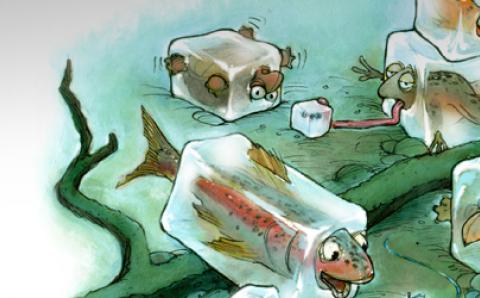What does a text written by two dead white guys who lived in Europe over 560 years ago have to say to today’s urban young people?
In 2006, the youth director at my church asked to me to take a 16th-century teaching tool of Reformed theology and translate it for a group of 21st-century digital natives, young people from both the church and the community. Some of them had Bible knowledge; others had none. I had my work cut out for me. Could the Heidelberg Catechism speak to the hopes and fears of young people from the hip hop culture?
What was happening at my church in 2006? That year two church members intervened when a young woman was stabbed in our church parking lot and then hid under a car from her client. Does God have an answer for her? Also that year, my next-door neighbor was using violence to intimidate young people who were not members of his gang. Is there a good word for them from the Heidelberg? A young man who attended Bible study at our church wanted to be mentored—but his family life overpowered his intentions to follow Jesus. Do the words of two young cats from faraway Germany in the distant past have anything to encourage him?
I have spent over 20 years of pastoral ministry in an urban context where issues center on the big questions of life. Hell and heaven, judgment and grace, and salvation are constantly on kids’ minds. They wonder if God has any good answers to their hopes and fears. Does God care about their economic life, their relational life, and their spiritual life? Does God care about them at all?
In 1563, King Frederick III asked two young theologians—Zacharias Ursinus and Casper Olevianus—to write a biblically based tool that could be used by preachers and teachers. According to the Preface, the purpose of this catechism was to educate young people in the Word of God so that they could live in accordance with it. Ursinus and Olevianus were called to translate a fledgling faith for their generation.
I was following a trusted path to get sound theology into my young people and speak to their hopes and fears. Most of them proudly wore T-shirts featuring the late rapper, Tupac Shakur, to youth meetings and mission trips. Shakur, who was shot and killed in 1996, has been the prophet for the hip hop soul. Why do young urban people—and some adults—continue to listen to him? In his book Holler If You Hear Me, theologian Michael Eric Dyson quotes Shakur in a prison interview: “‘I’m just trying to speak about things that affect me and about the things that affect our community.’” Shakur told the truth about life as it is. I needed a text that was bold and honest enough to do the same. The Heidelberg Catechism—unafraid to tell it like it is—was the right document.
The text doesn’t start with bad news. Question and Answer 1 reframes human identity in the context of being embraced and owned by the Father. I translated “What is your only comfort?” to “Who’s your daddy?” to preserve the personal tone the writers stressed throughout the catechism. In a context where many young people have strained relationships with fathers, the introduction speaks to their unconditional acceptance by and connection with their holy Father. “I am the property of Jesus Christ, all of me, body and soul, for all times, in life and death; I am his property because he purchased me with his blood; and then he freed me from the grasp of the devil; I know this because the Holy Spirit assures me that it’s true, and he makes me wholeheartedly ready and willing to live for him.” This version resonated with them.
Question and answer 2 addresses how to acquire this new life in Christ: “How do I get to live this life? I have to understand how great my sin is; I have to understand the hugeness of what God did to save me; I must be filled with a desire to express my thanks to God for what he done for me.” That was a breath of fresh air, truly good news for my young people to hear. They were eager to learn more about this God who was truly interested in their stories as they found themselves in his story.
The catechism’s three main parts are often called “sin, salvation, and service” (or “guilt, grace, and gratitude”). The “sin” section of the catechism speaks to life as it lived on the street and in the neighborhood. So question 3, “How do you know your misery?” was recast as “What’s your ghetto report card?” Question 7 was changed from “Then where does this corrupt human nature come from?” to “Naughty by nature.” Question 10, “Will God permit such disobedience and rebellion to go unpunished?” became “Will we pay the cost to be the boss?”
The “salvation” section introduces God’s rescue plan for us in Jesus Christ. The road of deliverance takes us through many stops on the salvation train. In question 13 we ask, “Do I have enough to cover the cost?” Our response can only be, “Not even close; in fact, our guilt increases every minute, every day.” Question 19 is translated as, “How will the revolution be televised?” It can be viewed from God’s whole story of creation, fall, redemption, and new creation.
The last section has to do with our “service” to the Lord. Once we know how great our sin is and our desperate need for a Savior, what can we do to say thanks for all God has done for us? I wanted young people to not reduce God to a set of “oughts” and “shoulds.” I wanted them to see in the commandments an opportunity be honest about the sin in their lives, to accept God’s salvation in Jesus, and then live out their grateful responses to God’s outpouring of grace.
Question and answer 86 begins the gratitude section powerfully. The question is long, so I recast it as “Giving God his propers (respect) is good?” In other words, God deserves our respect. The answer is, “We did not and cannot do anything to be worthy of the salvation that God offers us through Jesus Christ. But we can show our thanks for this salvation by choosing to live by the Spirit, who is constantly changing us to be more like Jesus so that others can know Jesus through us.”
My young people want people to respect them. So does God. Bible texts that concur with the answer are included for an even more powerful witness: Romans 12:1-2; Romans 6:13; Matthew 5:16; Galatians 5:22-24. These young people understood the need to give the Lord his proper due—in the light and dark places of their hearts and lives. Our conversations were engaging, thoughtful, and profound. The Holy Spirit showed up mightily.
So can the Heidelberg Catechism be useful in any context?
Absolutely—if teachers, pastors, and lay leaders are willing to translate the catechism so that it speaks to the hopes and fears of young people in their contexts. I heard the catechism for the first time in 1977. At first glance, I didn’t take to its rich themes. Now I know that it’s a text that’s still relevant to life lived at street level.
You’ll find samples of the author’s “translation” of the Heidelberg Catechism at the end of the article
Introduction: COMFORT
Lord’s Day 1
Q & A 1 WHO’S YOUR DADDY?
I am the property of Jesus Christ, all of me,
body and soul, for all times, in life and in death!
I am his property because he purchased me with
his blood; and then he freed me from the grasp of the
Devil.
I know this because the Holy Spirit assures me that it’s
true, and he makes me wholeheartedly ready and
willing to live for him.
Scripture:
Matthew 10:29-31
Luke 21:16-18
John 10:27-30
Romans 14:7-9
I John 3:1
Q&A 2 HOW DO I GET TO LIVE THIS GOOD LIFE?
I have to understand how great my sin is.
I have to understand the hugeness of what
God did to save me.
I must be filled with a desire to express my
gratitude to God for what he did.
Sin: THE LAW
Lord’s Day 2
Q&A 3: WHAT’S YOUR GHETTO REPORT CARD?
The Law of God
Romans 3:20 Therefore no one will be declared righteous in his sight by observing the law; rather, through the law we become conscious of sin.
Q&A 4: WHAT’S LOVE GOT TO DO WITH IT?
The Summary of the Law
Matthew 22:37-40 Jesus replied: “‘Love the Lord your God with all your heart and with all your soul and with all your mind.’ This is the first and greatest commandment. And the second is like it: ‘Love your neighbor as yourself.’ All the Law and the Prophets hang on these two commandments.”
Q&A 5: ARE THERE ANY HATERS IN THE HOUSE?
I have a natural tendency to hate God and my neighbors.
Romans 3:9-20 What shall we conclude then? Are we any better? Not at all! We have already made the charge that Jews and Gentiles alike are all under sin.
As it is written:
"There is no one righteous, not even one; there is no one who understands, no one who seeks God.
All have turned away, they have together become worthless;
there is no one who does good, not even one.
"Their throats are open graves; their tongues practice deceit."
"The poison of vipers is on their lips." "Their mouths are full of cursing and bitterness." "Their feet are swift to shed blood; ruin and misery mark their ways, and the way of peace they do not know." "There is no fear of God before their eyes." Now we know that whatever the law says, it says to those who are under the law, so that every mouth may be silenced and the whole world held accountable to God. Therefore no one will be declared righteous in his sight by observing the law; rather, through the law we become conscious of sin.
Sin: TOTAL DEPRAVITY
Lord’s Day 3
Q&A 6: ARE WE ANGELS WITH DIRTY FACES?
God created people good, and in his own image—totally right and pure—because he wanted to have an awesome relationship with them.
Q&A 7: NAUGHTY BY NATURE
Things changed when Adam and Eve decided to disobey God in the Garden of Eden. Their disobedience got in our DNA because Adam is the father of us all. So now we are born sinners.
Q&A 8: CAN I GET HIGH?
Yes, you can get high with God when you are born again.
Genesis 1:27 So God created man in his own image,
in the image of God he created him;
male and female he created them.
Genesis 1:31 God saw all that he had made, and it was very good.
Ephesians 4:24 created to be like God in true righteousness and holiness.
Romans 5:12 Therefore, just as sin entered the world through one man, and death through sin, and in this way death came to all men, because all sinned—
Romans 5:18-19 Consequently, just as the result of one trespass was condemnation for all men, so also the result of one act of righteousness was justification that brings life for all men. For just as through the disobedience of the one man the many were made sinners, so also through the obedience of the one man the many will be made righteous.
Psalm 51:5 Surely I was sinful at birth, sinful from the time my mother conceived me.
John 3:3-5 In reply Jesus declared, "I tell you the truth, no one can see the kingdom of God unless he is born again."
"How can a man be born when he is old?" Nicodemus asked. "Surely he cannot enter a second time into his mother's womb to be born!"
Jesus answered, "I tell you the truth, no one can enter the kingdom of God unless he is born of water and the Spirit.
Sin: JUSTICE
Lord’s Day 4
Q&A 9: IT’S NOT MY FAULT, RIGHT?
Sorry! God created us with the ability to keep the law. We just keep making bad choices.
Q&A 10: WILL WE PAY THE COST TO BE THE BOSS?
God is mad about the sin we were born with and the sins we personally commit; because he’s holy, he insists that someone has to pay the price.
Q&A 11: CAN I GET SOME MERCY?
You certainly can! “Sin is not only an act we commit, not only a human failure that makes us inadequate, not only a condition of spiritual impotence, but also a power that enslaves us-a power from which no one but God can rescue us. That power rules us from birth. None of us is born free. We are born in prison.”
Three excuses we use to avoid the reality of God’s justice
-it’s not my fault
-it’s no big deal
-God’s too nice to get mad.
Salvation: ATONEMENT
Lord’s Day 6
Q&A 16 WHAT’S A TRUE DELIVERER?
A human being who has never sinned.
Q&A 17 WILL ANY GOD DO FOR ME?
Only a TRUE GOD could bear the punishment for every single sin of every single person from the beginning of time; and restore me to a real relationship with God.
Q&A 18 WHO’S MY DAWG?
My Lord and Savior Jesus Christ, who came to me to set me free and make me right with God.
Q&A 19 HOW WILL THE REVOLUTION BE TELEVISED?
We know from the Bible.
Salvation: CHURCH
Lord’s Day 21
Q&A 54: HYPOCRITES WANTED? or WHAT DO YOU BELIEVE ABOUT THE CHURCH?
I believe that God the Son
through God the Spirit and the Word,
out of the entire human race- from the beginning to the end,
gathers, protects, and preserves for himself
a community chosen for eternal life
and united in true faith. I can be a part of this community forever, if I chose.
Q&A 55: OUR POSSE? or WHAT IS A CHURCH COMMUNITY?
First, that every believer is a member of this community.
Second, that each member has a duty to use his (or her) gifts (or talents) cheerfully and readily, to serve and encourage the other members.
Service: THANKS!
Lord’s Day 32
Q&A 86: GIVING GOD HIS PROPERS IS GOOD?
We did not and can not do anything to be worthy of the salvation
that God offers us through Jesus Christ. But we can show our
gratitude for this salvation by choosing to live by his Spirit, who is constantly changing us to be more like Jesus so that others can know Jesus through us.
When we are living a Spirit filled life, it helps us to know that we are saved, because we and others can see the evidence of God’s mark on our lives.
Romans 12:1-2 Brothers and sisters, God has shown you his mercy. So I am asking you to offer up your bodies to him while you are still alive. Your bodies are a holy sacrifice that is pleasing to God. When you offer your bodies to God, you are worshiping him. Don't live any longer the way this world lives. Let your way of thinking be completely changed. Then you will be able to test what God wants for you. And you will agree that what he wants is right. His plan is good and pleasing and perfect.
Romans 6:13 Don't give the parts of your body to serve sin. Don't let them be used to do evil. Instead, give yourselves to God. You have been brought from death to life. Give the parts of your body to him to do what is right.
Matthew 5:16 In the same way, let your light shine in front of others. Then they will see the good things you do. And they will praise your Father who is in heaven.
Matthew 7:17-18 In the same way, every good tree bears good fruit. But a bad tree bears bad fruit. 18 A good tree can't bear bad fruit. And a bad tree can't bear good fruit.
Galatians 5:22-24 But the fruit the Holy Spirit produces is love, joy and peace. It is being patient, kind and good. It is being faithful and gentle and having control of oneself. There is no law against things of that kind. Those who belong to Christ Jesus have nailed their sinful nature to his cross. They don't want what their sinful nature loves and longs for.
Q&A 87: CAN AN UNREPENTENT PIMP MAKE IT TO HEAVEN?
No, turning to God means we turn away from our old ways.
Web Questions:
- Why does a confession like the Heidelberg Catechism require translation for today’s urban youth? Can you give examples from the catechism where that is so?
- How would you answer Smith’s question “Is there a good word . . . from the catechism” for young people who are being intimidated by violence?
- Smith observes that in his urban ministry, “hell and heaven, judgment and grace, and salvation are constantly on kids’ minds.” How does the Heidelberg Catechism speak to those concerns?
- Review some of Smith’s “translations” (e.g.: “Who’s your Daddy” for “What is my only comfort in life and in death.” Do they appropriately reflect what the Catechism teaches? What’s preserved? What’s lost?
- Smith writes, “Now I know that it’s a text that’s still relevant to life lived at street level.” How is that the case for young folks in an urban environment? How is it true for you?
About the Author
Reginald Smith is the Director of Diversity for the Christian Reformed Church. He attends Madison Square Church in Grand Rapids, Mich.









